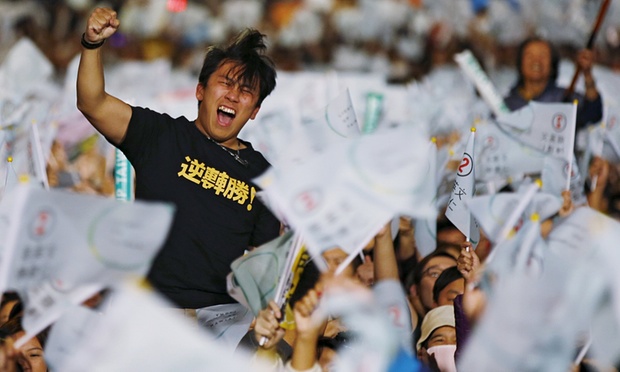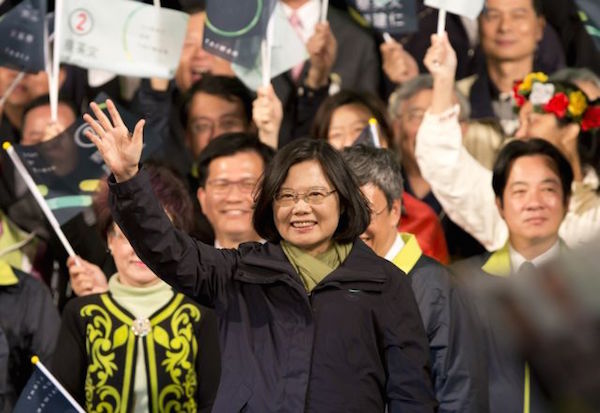Tsai Ing-wen wins historic victory as voters express dissatisfaction with economy and outgoing leader.
Taiwan’s first female president has vowed to build a new era of politics after sealing a historic landslide election victory that is expected to strain the state’s relationship with China.
With more than half of the votes counted, the Democratic Progressive party (DPP) candidate, Tsai Ing-wen, had built an unassailable lead over her closest rival, the Nationalist (KMT) candidate, Eric Chu.
“Thank you for helping the DPP stand up again and for trusting us to govern this country,” Tsai, 59, said in her victory address on Saturday night. “We will put political polarisation behind us and look forward to the arrival of a new era of politics in Taiwan.”
Earlier Chu, 54, had conceded defeat telling his supporters: “We have failed the expectations of all voters.” More than 20,000 DPP supporters gathered outside the party’s headquarters in Taipei to celebrate Tsai’s victory, shouting: “We are making history.”
“For me this is not just about an election victory,” Tsai said in her first address after the results became clear. “The results today tell me that the people want to see a government more willing to listen to the people, a government that is more transparent and accountable, and a government that is more capable of leading us past our current challenges and taking care of those in need. They tell me that the people expect a government that can lead this country into the next generation and a government that is steadfast in protecting this country’s sovereignty.”

Tsai narrowly lost out on the presidency four years ago. The London School of Economics postgraduate had considered a return to academia before deciding to launch a second attempt at Taiwan’s highest office.
Analysts have said growing public dissatisfaction with the outgoing KMT president, Ma Ying-jeou, and an economy that weakened dramatically last year, helped propel Tsai to victory. Her success ends eight years of KMT rule, during which there has been an unprecedented thaw in relations between the self-ruled island and China.
Ma, who gained the presidency in 2008, had faced increasing criticism for what critics described as his opaque style of governance and the widespread perception that his pro-China policies had failed to deliver significant economic gains.
His detente with Beijing culminated in a historic cross-strait summit with Xi Jinping last November but critics said the blossoming trade and tourism ties had done little to improve ordinary people’s lives.
“Over the past four years, I’ve travelled around Taiwan, I’ve seen the suffering of the people and I’ve heard the public’s call for change,” Tsai told her final campaign rally on Friday. “Democratic politics is responsible politics, if [a government] cannot do it well, then we change it.”
Tsai’s victory will alarm China’s Communist party leaders, who still view Taiwan as part of their country’s territory and hope one day to reabsorb the island, which has ruled itself since 1949. Beijing’s army of internet censors blocked her name on Saturday night as the scale of the DPP victory became apparent.
“[The election result] could exert a profound influence on the region,” the party-run Global Times tabloid warned this week in an editorial. “It adds uncertainties to Taiwan’s mainland policy as well as the situation across the straits.”
Tsai largely avoided commenting on bilateral relations during campaigning but her party has traditionally supported formal independence from China, rather than the current de facto independence. Beijing has vowed to use military force against attempts at formal independence and keeps more than 1,000 ballistic missiles facing across the Taiwan Strait.
However, experts say they do not expect dramatic changes in Taiwan’s stance on China when Tsai takes power in May.
“I really don’t think that [bilateral relations] are going to be the first item on her agenda. I think her main focus, especially in the first few years, is going to be more on domestic issues, talking more about doing social welfare programs, maybe revising the tax code, probably doing some kind of big judicial reform, attacking the food safety system,” said Nathan Batto, a political scientist from Taipei’s Academia Sinica.
“As far as cross-strait [ties] goes, I really think that she is interested in the status quo. Let’s continue to have talks in which we disagree about what the country is, or, for that matter, whether there is one country. But whatever contracts have already been signed, that is fine. Tourists should continue to come, investment should continue to go there, jobs and Taiwanese companies in China should continue to be able to operate as Taiwanese companies.
“If all that stuff changes it will be because China decides to change it. And I think she is putting the onus on China,” Batto said.
J Michael Cole, a senior fellow at the University of Nottingham’s China Policy Institute, said: “The variable here will be how Beijing reacts to a DPP victory. My sense is that by now the Chinese government should know enough about Taiwan to know that the last thing it wants to do is to punish the Taiwanese for their voting choices.
“China’s ability to punish Taiwan is actually surprisingly limited because pretty much anything that it does to alienate the Taiwanese would be counterproductive. The last thing that China wants right now is to propel Taiwan in a different direction. So how do you keep it as close as possible? By continuing to engage it.”
Speaking on Saturday night after her victory, Tsai vowed to “greatly contribute towards peace and stability in the region”.
She said: “During this election I have promised on many occasions that I will build a consistent, predictable and sustainable cross-strait relationship. Following the will and consensus of the Taiwanese people, we will work towards maintaining the status quo for peace and stability across the Taiwan Strait in order to bring the greatest benefits and well-being to the Taiwanese people.”
She added: “I will march forwards, together with the 23 million people of Taiwan. Together we will overcome the challenges that this country faces. We will not be divided by an election. Instead we will become even more united because of our democracy.”
Source: TheGuardian/WorldNews
Photo: President-elect Tsai Ing-wen waves supporters at DPP headquarter on January 16, 2016 in Taipei, Taiwan. Tsai Ing-wen, the chairwoman of the opposition Democratic Progressive Party, won the presidential election to become the Taiwan’s first female leader. (Photo by Ashley Pon/Getty Images)
